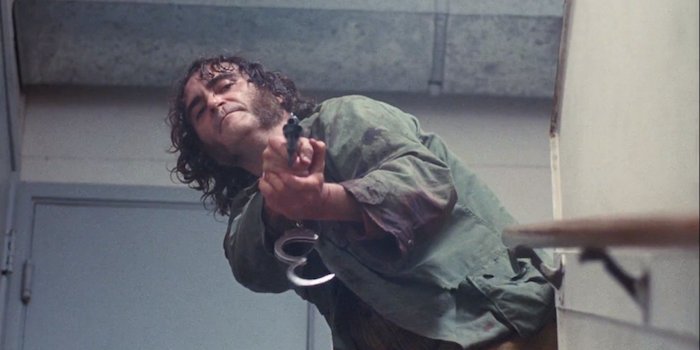Inherent confusion.
The H-Bomb: Larry “Doc” Sportello (Joaquin Phoenix) is a stoner private eye in 1970’s Los Angeles, who is visited out of the blue, late one night, by his ex-flame, Shasta Fay Hepworth (Katherine Waterson). She tells him about a plot against her new boyfriend, wealthy real estate tycoon Mickey Wolfmann (Eric Roberts), in which his wife, Sloane (Serena Scott Thomas), and her hunky lover plan on having Mickey committed to a mental institution. Surely enough, Mickey goes missing, and not long after, so does Shasta Fay.
For Doc, all of this is only the tip of the iceberg, as he is soon contacted by other clients to go searching for other missing people… people who are all connected to Mickey Wolfmann in some way or another. However, when one of the missing persons cases turns into a murder case, Detective “Bigfoot” Bjornsen (Josh Brolin), steps in and starts pressing Doc for answers. From there, Doc’s investigation takes him on numerous tangents, donning various disguises, and interacting with some exceptionally unsavory characters, including neo-Nazis, missing musicians, drug runners, and a lecherous dentist (Martin Short), in what becomes one of the most spectacularly confounding noir plots this side of The Big Sleep.
At the center of all this discombobulating madness is Doc, who sticks to a rigorous drug regimen as he attempts, in vain, to make sense of any of it. Despite his best efforts, though, at the end of the day, he is just as confused as we, the audience, are.
I tried to paint the plot in broad strokes in order to give it as concise a description as possible. However, there is no concise way to break down the plot of Inherent Vice, which goes off in about a million and a half different directions, and continues to twist and turn all the way to the end of its two-and-a-half hour running time. It’s the kind of scenario that Raymond Chandler would have cooked up, had Raymond Chandler been a habitual pot smoker who occasionally dropped acid.
Writer/director Paul Thomas Anderson has made films with large ensemble casts and challenging themes, however, with Inherent Vice, adapted from the novel of the same name by Thomas Pynchon, Anderson finds himself making his first plot driven film, and man did he pick one hell of a mind scrambler. Sticking close to Pynchon’s novel (which I have read, and found just as impenetrable as the film), Inherent Vice has been described by some as Chinatown meets The Big Lebowski, and while that is a fairly accurate surface level description, it doesn’t really prepare the viewer for just how utterly convoluted things become.
Convoluted, wacky, surreal, absurd… perhaps the best thing the audience could do is to actually get high before sitting down to watch Inherent Vice. It seems to me that the film and the novel are both intentionally confusing in order to put us in the shoes of its protagonist, who is often completely lost in the story, and even by the end, doesn’t at all have a clear view of the big picture. Doc will often take notes while interviewing someone, and when we are shown the notes, we see that what he’s written down are things like, “Am I hallucinating?” Is he? Are we? Who can be sure? We know what Doc knows, which isn’t much, and what we do know, we can’t be sure is real. I’m sure I’m making no sense at this point, which serves this movie right.
Sporting a puffy fro, and a mean set of mutton chops, Phoenix is perfectly cast as the perpetually bewildered Doc. He’s a private dick involved in a case that goes so far over his head, he can’t even see the top of it, and he deals with it very much in the same manner that the Lebowski’s Dude would, by toking up and just going with the flow. Phoenix’s hilariously deadpan, slightly out of it performance will perhaps remind many of the actor’s infamous appearance on the Letterman show some years back, and that ain’t necessarily a bad thing.
As stated, Anderson is no stranger to working with large ensembles, and here, he has assembled quite the list of supporting players; Owen Wilson, Benicio Del Toro, Reese Witherspoon, Jena Malone, Michael K. Williams, Maya Rudolf, and the aforementioned Eric Roberts and Martin Short. Most only get a scene or two each, yet they all leave an impression. The stand outs are Brolin, who steals every scene he’s in as the short-fused cop they call Bigfoot, and Waterston, who gives as impressive a breakout performance as any I’ve ever seen as Doc’s hippie femme fatale, Shasta Fay. I’d say these two are both very deserving of Best Supporting Actor and Actress nods, should the Academy feel inclined to recognize this film for anything, which it may or may not.
Inherent Vice has Anderson returning to 1970’s Los Angeles, although instead of taking us back to the disco days of Boogie Nights, he brings us to the end of the “Free Love” era, where the smell of pot lingers in the air, and practically comes off the screen. Between the spot on sense of time and place, the often dense dialogue, and the lackadaisical pacing, I often found myself lulled into a trance by the movie, where scenes would just kind of wash over me, and I must admit, I enjoyed the experience.
Many will surely be turned off by the leisurely pace and the labyrinthine storyline, and that is perfectly understandable. Anderson’s films typically cater to limited audiences, and Inherent Vice is no different, in that regard. I’m not going to pretend that I pieced the entire puzzle together, because I surely did not… I don’t think anyone can after a single viewing. However, unlike most movies that come out nowadays, this is a psychedelic head trip that I am very interested in taking again.




